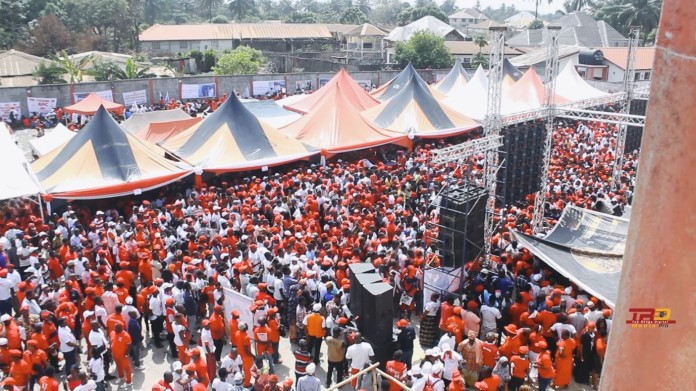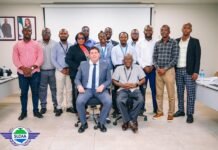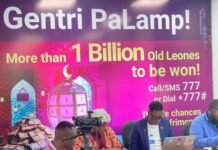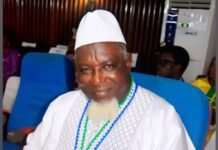By Sheriff Mahmud Ismail
On Sunday, February 12, at the APC Northern Region headquarter in Makeni, Dr Samura Kamara formally declared his intent to lead the main opposition All Peoples Congress (APC). In addition to the frenzied euphoria of electoral victory for candidate and party, there’s a certain feeling of impatience among ordinary people and an urgency towards the general elections. The message was clear; the country has suffered unprecedented good governance and economic reversals and the main opposition, which has endured tremendous suppression and persecution, is rebounding and poised to take power in a way no one imagined. The negative economic indices and their real effect of biting hardship appear to have inspired a sheer determination and doggedness by the rank and file of the APC. Former Ministers, Members of Parliament and Councillors past and present, leaders and members of other political parties graced the occasion in such huge numbers that the event looked like a party convention. Newly elected officials from the various districts and regions, who would eventually become delegates to vote (at the NDC), attended along with busloads of supporters and with all manner of banners endorsing Kamara’s candidature.
Kamara led the APC into the polls in March 2018 after a selection process which some of his ‘challengers’ were unhappy with. Owing to that fallout, the APC has put itself through a period of agitation, litigation and reforms, resulting in a new constitution and ‘Court Ordered’ conventions. It is through those rigorously conducted conventions that the new crop of leaders was elected at the levels of the Ward, Constituency, District, Regional, and ‘Special Organs’. Those elections laid the basis for the Party’s National Delegates’ Conference (NDC), slated for next week, where its ‘national officers’ and the party’s standard bearer will be elected.
So far, no less than six aspirants have declared for the leadership of the APC. This indicates that despite his incumbency, Samura Kamara is up against an internal opposition that could not be ignored. This fact is not lost on the man widely presumed to once again emerge as leader of the main opposition. Kamara’s declaration past Sunday was a clear demonstration of strength of support but critically also, of readiness to lead both in terms of the content of his address and the deftness in the way the event was organized. This comes on the back of the incumbent Sierra Leone’s Peoples Party (SLPP)’s desperation for re-election. The President Maada Bio – led SLPP Government has explored every tactic in voter suppression and in its fierce persecution of the APC and its leaders. Even the APC ordinary supporters have not been spared of the intimidation, harassment, detention, confiscation of their small businesses and destruction of their livelihoods. Not surprisingly, Samura Kamara’s message emphasized on internal party reconciliation, peace, unity and collaboration as the only path through which the APC could unseat the ruling SLPP.
“…We should be responsive to the urgent need for a united and focused APC… to effectively hold this government accountable and (to) win the 2023 elections,” he said. Kamara also made the point that “there could be no unity in the APC without genuine reconciliation and understanding that put the party’s interest above all other considerations.”. In an apparent reference to his competitors, he urged for collaboration in the overall interest of the APC. “We are on the verge of the NDC, so it is imperative that we put personal ego aside and walk the APC to State House.”
Without a doubt, the major issue for these elections is the cost-of-living crisis which imposes the need for proven experienced leadership able to effectively handle the Sierra Leone’s desperate economic situation. There appears to be a consensus among Sierra Leoneans that the nation cannot afford another five years of the current economic failure -a day added to the misery of the SLPP tenure will be a disaster for the suffering massess! No one could be more aware of this reality than the man who has bestridden the economic landscape of Sierra Leone for over three decades. Apart from his earlier middle level roles in the Bank of Sierra Leone in the early 80s; between 1990 and 2014, he served as Sierra Leone’s Financial Secretary, Governor of the Bank of Sierra Leone and as Minister of the Finance and Economic Development. During this period, he led several economic reforms and tax initiatives, including the establishment of revenue generating institutions such the National Revenue Authority (NRA), the National Social Security and Insurance Trust (NASSIT). The presumptive APC presidential candidate was also integral to the country’s Poverty Reduction Strategy Paper (PRSP) II and spearheaded the PRSP III. His leadership of the nation’s economy has been credited for the stability and growth of a wide range of macro -economic fundamentals.
However, Kamara’s reading of the current governance and economic situation is damning. “…the Bio-led Sierra Leone Peoples Party Government is leaving behind most of our institutions and infrastructure in a terrible state of decay and shame; there is increasing insecurity and the quality of life of the vast majority of our people has considerably deteriorated; our collective image and national esteem has plummeted whilst the economy has sunk rapidly into vicious depth due to incompetence and mismanagement,” he said.
But it was not more so what he said than what he did not say. In a power point presentation titled, “Sierra Leone -Macroeconomic Performance (2008 -2022),” which was shared during his declaration event, Samura Kamara backed up his assessment of the economy with the figures which laid bare the magnitude of the economic crisis facing Sierra Leone.
- Real GDP growth declined from 3.8% (2017) to 2.8(2022)
- CPI Inflation rose 15.3% (2017) to 37.1 (2à22)
- Expenditure increased from (6.4 trillion or 23.5% of GDP to 12.5 trillion or 28.4% of GDP (2021)
- In 2022, total expenditure amounted to 13.7 trillion nominal terms (25%.8) of GDP
- The Wage Bill increased from Le 1.89 trillion (6.9% of GDP) in 2017 to 4.3 trillion (8.1% of GDP) in 2022
- Public Debt Stock to GDP increased from 69% (2017) to over 90% (2022) bringing the economy into a risk of debt distress due to increased domestic borrowing which putting the economy on the brink of actual debt distress
- Total public debt is equivalent to over USD3.0 billion as at end 2022
- Exchange Rate (Leone to the US Dollar) unprecedented depreciation of the Leone from 2017 to 2022 stands at 147%.
And he did not just criticise, he offered assurances that he was ready to take and build back the country, unite its people and move speedily to alleviate the suffering of the masses by salvaging the economy which he said had collapsed under the current SLPP leadership. To achieve this, Kamara acknowledged good governance, together with accountability and probity, as fundamental requirements. He also expressed the view that there is a need to bring about a fair, just, secure and orderly management of public affairs in such a way that the rule of law is upheld and that institutions could work in accordance with their mandates.
“We will effectively support public institutions to be better able to institutionalise democracy and the rule of law, and shall build a public service that is fit for purpose…. There is a need to build a country where if you show up, step up, work hard, you will have you fair share of its wealth; a country in which hard work pays, and cutting corners does not. A country in which no matter the tribe or where you come from, you will be rewarded based on merit, not on whom you know; a country in which every young person can hope, and aspire, and reach his or her full potential right here in Sierra Leone.”
The presumptive APC presidential candidate urged his party and the country to make informed choices on polling day. “We must make a choice for growth, for prosperity, for democratic freedoms, and for national cohesion. We must make a choice for competence and for sympathetic leadership. We must make a choice for a leader that understands the challenges our nation is facing and has the experience and proven track record to lead the design and delivery of the solutions to those challenges…,” he said.
In the 2018 elections, the APC hemorrhaged considerable support particularly in Kambia in the Northeast and in Kono in the East owing to Kandeh Yumkella’s National Grand Coalition (NGC) and former APC Vice President ,Samuel Sumana’s Coalition For Change (C4C). Both parties have lost their vibrancy and are largely in disarray. The upcoming elections in June 24 will therefore be a stiffly contested two-horse race between the main opposition APC and the incumbent SLPP. Public opinion may be on the side of the opposition but beyond the fanfare and the public endorsements, there is evidence of voter suppression and an uncanny use of the security forces in of favour of the ruling party. Electoral victory for the APC would therefore be assured only if its leaders work together, if it organized itself very well in a way that it could protect its votes and ensure every ballot counts.




